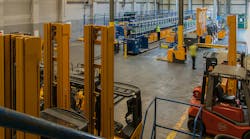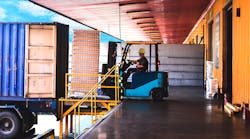Every part of the contiguous United States has experienced cold weather this winter. That was apparently enough of an inducement for OSHA to issue a press release about winter’s dangers. The intent was to remind employers to “take necessary precautions to protect workers from the serious, and sometimes fatal, effects of carbon monoxide exposure.”
The reminder came with this story to illustrate the Agency’s cause for concern:
“Recently, a worker in a New England warehouse was found unconscious and seizing, suffering from carbon monoxide poisoning. Several other workers at the site also became sick. All of the windows and doors were closed to conserve heat, there was no exhaust ventilation in the facility, and very high levels of carbon monoxide were measured at the site.”
This kind of thing happens all the time, according to OSHA. The culprits? Fuel-burning equipment and tools used in buildings or semi-enclosed spaces without adequate ventilation. The press release listed the following: gas generators, power tools, compressors, pumps, welding equipment, space heaters and furnaces. Conspicuously missing from this list was any mention of propane powered forklifts.
This was probably an oversight, so I thought I’d amend their announcement for the benefit of MH&L’s audience in particular. Forklifts are such an integral tool to warehouses that they’re almost like the air workers breathe—taken for granted. But forgetting to ventilate a warehouse’s work area for operators on LP trucks can prove suffocating—even in the summertime.
It was September when four workers at a food distribution center, including a forklift driver, suffered nausea and almost passed out while unloading an idling diesel truck. The forklift happened to be LPG-powered, so that contributed to the seriousness of this incident.
The warehouse had some natural ventilation, but no mechanical ventilation. Idling vehicles, no CO alarms and poor employee training all contributed to the danger. This story was recounted in a publication from the Washington State Dept. of Labor and Industries. Washington State is heavily agricultural, with a lot of heavy lifting needed both outdoors and indoors. This explains why carbon monoxide poisoning is a common occurrence there.
So never mind the fact it’s cold outside. Forgetting about carbon monoxide is a year-round hazard—as common as inadequate forklift operator training. Many times those two go hand-in-hand. The consequences can be as fatal to a business as they are to its people.
Here’s a case in point courtesy of another OSHA press release: Fritz Aluminum Services Inc. OSHA came down hard on this company last year, citing it for 37 violations, including combustible dust accumulations, at the company's Eustis, Florida, facility. Three willful violations proved to be the most damning in OSHA’s eyes: failing to provide workers with an abrasive blasting suit or apron during sandblasting operations, not replacing missing and clogged filters in the powder coating booth, and not implementing a housekeeping program or providing proper ventilation to keep combustible dust accumulations at a minimal level. Fritz got socked with $139,800 in proposed penalties and eventually went out of business.
But something about this announcement made me a bit nauseous. The company was also cited for six “other-than-serious” violations, including failure to have forklift operators complete a refresher training course in the last three years; failure to certify the training of forklift drivers; and failure to remove defective or unsafe powered industrial trucks from service. The OSHA press release about this incident describes an other-than-serious violation as one that “has a direct relationship to job safety and health, but probably would not cause death or serious physical harm.”
Huh? First of all, the release doesn’t say whether these lift trucks were electric or propane powered, but being that LP trucks are common in aluminum plants, it’s logical to think that these operators were exposed to carbon monoxide as well as to potentially explosive combustible dust. Even if these lift trucks were electric, were they rated ExplosionProof (EX-rated) for use in hazardous and explosive environments? The OSHA press release doesn’t say anything about that either.
But never mind any of that. Working in this kind of environment, just having untrained forklift operators is dangerous enough to be fatal. I wouldn’t classify the possibility of suffocation or being blown up “other-than-serious.” Apparently someone at OSHA could use a refresher on powered industrial truck appreciation.


